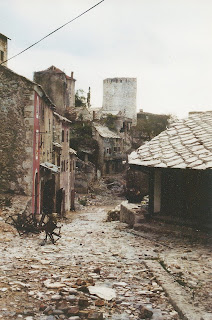This month marks the 21th anniversary of the start of the Bosnian War, a long, complex, and ugly conflict that followed the fall of communism in Europe. In 1991, Bosnia and Herzegovina joined several republics of the former Yugoslavia and declared independence, which triggered a civil war that lasted four years. Bosnia’s population was a multiethnic mix of Muslim Bosniaks (44%), Orthodox Serbs (31%), and Catholic Croats (17%). The Bosnian Serbs, well-armed and backed by neighboring Serbia, laid siege to the city of Sarajevo in early April 1992. They targeted mainly the Muslim population but killed many other Bosnian Serbs as well as Serbs with rocket, mortar, and sniper attacks that went on for 44 months. As shells fell on the Bosnian capital, nationalist Croat and Serb forces carried out horrific “ethnic cleansing” attacks across the countryside. Finally, in 1995, UN air strikes and United Nations sanctions helped bring all parties to a peace agreement. Estimates of the war’s fatalities vary widely, ranging from 90,000 to 300,000. To date, more than 70 men involved have been convicted of war crimes by the UN.
























